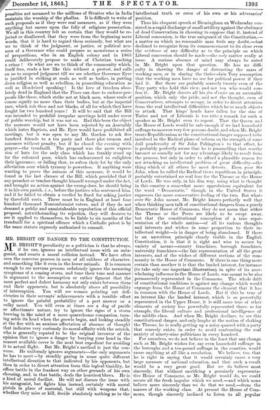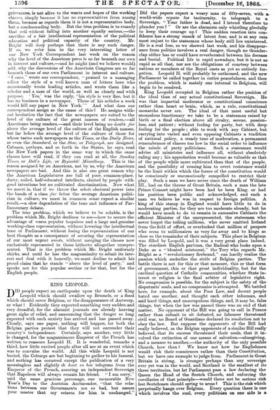Ma. BRIGHT ON DANGER TO THE CONSTITUTION.
W. BRIGHT'S peculiarity as a politician is that he always, 1.V1. if he can, ignores an intellectual issue with an anta- gonist, and courts a moral collision instead. We have often seen the converse process in men of all calibres of character, and something like it even in the lower animals. It is common enough to see nervous persons sedulously ignore the menacing symptoms of a coming storm, and tune their tone and manner in argument to the assumption or rather figment that the most perfect and dulcet harmony not only exists between them and their opponents, but is absolutely above all possibility of interruption. You will see women pointing out defi- ciencies in their servants' achievements with a terrible effort to ignore the painful probability of a pert answer or a sulky mood. You will even at times see a dog of pacific or affectionate nature, try to ignore the signs of a storm brewing in the mind of a more quarrelsome companion, turn- ing aside its bead when the growls begin, and looking steadily at the fire with an anxious affectation of absence of thought that indicates very curiously its moral affinity with the ostrich, who is generally reputed to be the original inventor of the opinion that to ignore a danger by burying your head in the nearest available cover is the next best expedient for avoiding it to actual flight. But Mr. Bright's method is just the con- verse. He uniformly ignores arguments—the only arguments he has to meet—by steadily gazing in some quite different intellectual direction to that indicated by his opponents, but then in order to divert attention from this logical timidity, he offers battle in the frankest way on other grounds of his own choosing, and, in that battle, deals the heartiest blows. He is a kind of moral duellist. He will not discuss the issue with his antagonist., but fights him instead, certainly with moral pistols in place of material, but still with weapons that, whether they miss or kill, decide absolutely nothing as to the
intellectual truth or error of his own or his adversaries' position.
Thus his eloquent speech at Birmingham on Wednesday con- sisted in a rapid discharge of small artillery against the obstinacy of dead Conservatism in choosing to suppose that it, instead of Liberal concession, is the true safeguard of the Constitution,— a matter on which no reasonable man feels any doubt,—but declined to recognize from its commencement to its close even the existence of any difficulty as to the principle on which Liberal concession should be made—the only matter really at issue. A curious absence of mind may always be noted in Mr. Bright upon that question. He has no diffi- pulty in showing the danger of distrusting the mass of working men, or in slaying the thrice-slain Tory assumption that the working men have no use for political power if they had it. But there are probably scarcely twenty even of the Tory party who hold this view, and not ten who would con- fess it. Mr. Bright directs all his feu d'enfin• on an untenable position, which only the pride, and not the thought, even of Conservatives, attempts to occupy, in order to divert attention from the real intellectual difficulties which he so much objects to attack. That kings' heads have fallen for the sins of Tories and not of Liberals is too trite a remark for such a speaker as Mr. Bright even to repeat. That the Queen and the House of Lords would be safe enough if we had household suffrage to-morrowvery few persons doubt., and when Mr. Bright treats Republicanism as the constitutional danger supposed to be involved in the Radical plans of reform on the strength of some dull ponderosity of Sir John Pakington's to that effect, he is probably perfectly aware that he is pommelling that worthy baronet so soundly not for any advantage likely to result from the process, but only in order to afford a plausible reason for not attacking an intellectual problem of great difficulty—the thing which of all others he most detests. Even poor Sir John, when he called the Radical views republican in principle, probably entertained no real fear for the Throne or the House of Lords. He was only, in his dim way, using what is thought. in this country a somewhat more opprobrious equivalent for the word Democratic," though in the United States it expresses the more conservative feeling of the two. But what- ever Sir John meant, Mr. Bright knows perfectly well that when thinking men talk of constitutional dangers from a purely Democratic House of Commons, they do not mean that either the Throne or the Peers are likely to be swept away, but that the constitutional conception of a true repre- sentation of the whole nation—of all its various thoughts and interests and wishes in some proportion to their in- tellectual weight—is in danger of being abandoned. If there is an unwritten principle clearly visible in the English Constitution, it is that it is right and wise to secure by variety of means—county franchises, borough franchises, university franchises—the fair representation of all the great interests, and of the wishes of different sections of the com- munity in the House of Commons. If there is one thing more certain than another it is that the landed interest, for instance (to take only one important illustration), in spite of its over- whelming influence in the House of Lords, was meant to be also permanently represented in the Commons. The whole drift of constitutional traditions is against any change which would expunge from the House of Commons the element that it has in common with the House of Lords. But if this be true of an interest like the landed interest, which is so powerfully represented in the Upper House, it is still more true of other elements of society less powerfully represented there. as for example, the liberal culture and professional intelligence of the middle class. And when Mr. Bright declines to see this constitutional danger, and only laughs at the notion of shaking the Throne, he is really getting up a noisy quarrel with a party that scarcely exists, in order to avoid confronting the real anxiety of ninety-nine politicians in every hundred.
For ourselves, we do not believe in the least that any change such as Mr. Bright wishes for, say even household suffrage in the boroughs and a ten-pound suffrage in the counties, would cause anything at all like a revolution. We believe, too, that he is right in saying that it would certainly cause a very large measure of national education, and that such a result would be a very great good. But we do believe most sincerely, that without sacrificing a genuinely representa- tive House of Commons, as Mr. Bright would do, we could secure all the fresh impulse which we need, —and which none believe more sincerely than we do that we need,—from the masses of the working class. At present the House of Com- mons, though sincerely inclined to listen to all popular grievances; is not Wive- to the wants and hopes of the working classes, simply because it has no representatives from among them, because as regards them it is not a representative body, but a condescending body. But the true problem is to remedy that evil without falling into another equally serious,—the sacrifice of a fair intellectual representation of the political education and political capacity of the country. Mr. Bright will deny perhaps that there is any such danger. If so, we refer him to the very interesting letter of our New York Correspondent last week on the reason why the level of the American press is so far beneath our own in interest and culture,—and he might (and we believe would) add, why the discussions of the American Congress are so far beneath those of our own Parliament in interest and culture. "I once," wrote our correspondent, "praised to a managing editor the style of a well known man of letters here who occasionally wrote leading articles, and wrote them like a scholar and a man of the world, as well as clearly and with purpose. Yes,' was the reply, his style is very fine, but it has no business in a newspaper. Three of his articles a week would kill any paper in New York.' " And what does our correspondent assign as the cause of this? He assigns with- out hesitation the fact that the newspapers are suited to the level of the culture of the great masses of readers,—all Americans being readers,—and their level being no doubt far above the average level of the culture of the English masses, but far below the average level of the culture of those for whose tastes such newspapers as the Times, or the Daily News, or even the Standard, or the Star, or Telegraph, are designed. Cabmen, potboys, and so forth in the States, he says, read the New York papers in the same way in which the same classes here will read, if they can read at all, the Sunday Times, or Bell's Life, or Reynolds' Miscellany. This is the reason assigned by an American, not by us, why the American newspapers are bad. And this is also one great reason why the American Legislatures are full of poor, common-place, dusty, soiled, half-educated intellects, elected by people with good intentions but no cultivated discrimination. Now what we assert is, that if we throw the whole electoral power into the hands of a class far below the average American politi- cian in culture, we must in common sense expect a, similar result,---a slow degradation of the tone and influence of Par- liamentary debate.
The true problem, which we believe to be soluble, is the problem which Mr. Bright declines to see—how to secure the advantage of warm popular impulses and a large and genuine working-class representation, without lowering the intellectual tone of Parliament, without losing the representation of our best thoughts as s consequence of securing the representation of our most urgent wants, without merging the classes now exclusively represented in those hitherto altogether unrepre- sented. That is the problem which Mr. Bright uniformly shirks, and until he has the magnanimity to admit its inte- rest and deal with it honestly, we must decline to admit his proud claim that he stands "above the level of party," and speaks not for this popular section or for that, but for the English people.



































 Previous page
Previous page